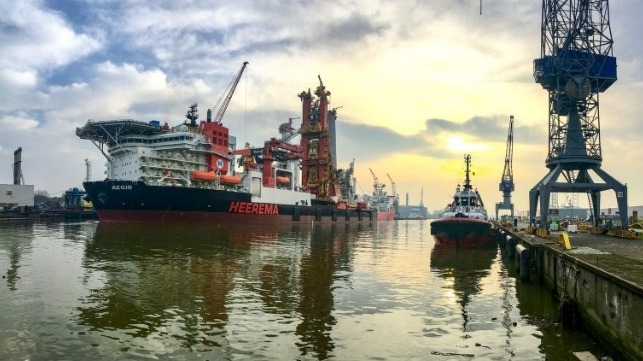Port of Rotterdam Gets First Polymer Logistics Hub

The Port of Rotterdam is known as a thriving hub for refining, bunkering and containerized cargo, and it says that it is also seeing increasing business from two very different sources - plastics and wind energy.
Construction work recently started on the new Rotterdam Polymer Hub logistics center, which will be the first logistics hub dedicated to polymer storage. Nearby Antwerp is a leading center for the polymers market, and Rotterdam is well situated to handle traffic to and from these industrial facilities. The hub will provide about 550,000 tonnes of polymer storage and 15,500 square meters of container storage space, along with a tilt platform for bulk containers.
"We’re sticking to a rigorous construction schedule," said Geert Van De Ven, the new hub's managing director. "Completion is planned for early March, and we aim to be operational by April 2020."
The hub's backers say that market interest in their facility is high due to congestion to and from Antwerp. "Maasvlakte [in Rotterdam] is a particularly efficient location: with excellent connections from and to the hinterland as well as being close to the deep sea container terminals. Another really positive point is that we will be the first non-container terminal connected on the Container Exchange Route (CER)."
The CER connects container facilities on Maasvlakte with one another, bundling container flows so that trains, barges and feeder vessels do not have to call on each terminal individually. It is part of a network of shoreside container connections and storage yards that the Port of Rotterdam expects to handle about 1 million boxes annually.
Wind farm traffic on the rise
Offshore is a component of Rotterdam's sprawling operation, and the first half of the year saw significant offshore vessel activity. The port says that 440 offshore vessels, including crane vessels, jack-up rigs and offshore construction vessels, have called in the past six months. It is a noticeable uptick: last year, about 700 offshore vessels called at Rotterdam.
In addition, the current average of about 75 monthly calls by offshore vessels is likely to continue to grow in the second half of 2019. Offshore wind activity is increasing sharply and a slight increase is expected in offshore oil and gas, the port says.
